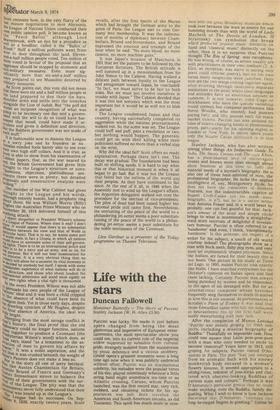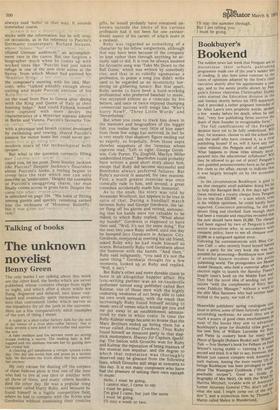Life with the stars
Duncan Fallowell
Monsieur Butterfly — The Story of Puccini Stanley Jackson (W. H. Allen £3.50) Puccini was lucky. He made it just before opera changed from being the most glamorous and impressive of European entertainments, the most spectacular show you could see, into its current role of the imperial widow supported by subsidies from cultural pride, strangely isolated from the mainstream by pious deference and a vicious snobbery. Grand opera's greatest moments were a long time ago now when it was publicly embraced without effort. Puccini was an international celebrity, his melodies were the popular tunes of his day, played relentlessly wherever a little string band might soundtrack tea-time or an Atlantic crossing. Caruso, whom Puccini launched, was the first record star, very rich, mobbed, and obtaining tickets for his appearances was hell. Both travelled the American and South.American circuits, as did Toscanini. This spirit has much more in corn mon with the great Broadway musicals which took over between the wars as source for our humming moods than with the world of Lady Macbeth or The Devils of Loudun. If Stravinsky can symbolise the break which produced 'popuiar music' distinctly on hand and 'classical music' distinctly on the other, then it is no surprise that Puccini thought The Rite of Spring was cacophony. He was wrong, of course, as artists usually are with practitioners in their own medium (T. S. Eliot, an exception, was naive in saying only poets could criticise poetry), out on 'riis own terms many suspicions were justified. Only now are the two wings coming togetner again, after evolving through oster,sioiy separate institutions to the point where their languages and attitudes have an enormous amount in common. It is not however John Cage or Stockhausen who have the queues vanishing round corners but composer-performers like Stevie Wonder, who recently had punters paying forty and fifty pounds each for black market tickets. Puccini too was amused by tales of tickets changing hanas at phenomenal prices, particularly for his opening nights in London or New York. In recent opera years only the bizarre Cailas comeoack is in this league.
Stanley Jackson, who has also written among other things An Indiscreet Guide To Soho, The Savoy, Caruso and The Khan, has a plain-hearted love of extravagant events and knows more than enough about show business at this time to fulfii the material needs of a layman's biography. He is also one of those least-admired of men, the professional biographer. He lacks the applied intelligence of, say, Montgomery Hyde, he does not have the robustness of fiesketh Pearson, nor the indestructible caprice of Rupert Croft-Cooke (on Ms tenth autobiography, is it?), but he is a better writer than Antonia Fraser and, in a world beset by prolixity, one can feel grateful for that. Jackson's amour of the stout and simple cliche brings to what is intentionally a straightforward story intervals of delightful if involuntary humour. Puccini is often referred to as 'handsome' and even, I think, 'exceptionally handsome.' Is this politesse, the respect of a writer for his subject, a touch of old world courtesy indeed? The photographs show us a man with buck teeth, fishy pop eyes, and very soon an unpleasantly shaped physique. Since the Italians are famed for their beauty this is not basta. One picture in his study at Torre
del Lago, in 1895, makes Puccini look exactly like Stalin. I have searched everywhere for the Dictator's opinions on Italian opera and find
them lacking. Certainly Puccini was always 'being punished by women and he responded, to the agon of his deranged wife. But for an international composer whose heroines
frequently sang themselves to death ill-starred in love this is not unusual. At performances of
,Scriabin's Poem of Ecstasy it was said that those Edwardian ladies who haG not collapsed in neurasthenic fits oy the first nalf were busily masturbating with their fans.
After the completion of Manon Lescaut "Puccini was already groping for fresh sub
jects, including a musical biography of
Buddha." Thankfully an impossible task. How could one square that Latin porn-porn-porn with a man who only needed to smile to become immortal? Years later in 1913, still groping for subjects. Puccini visited D'An
nunzio in Paris. The poet "had just emerged
from an aromatic bath with his sinewy monkeyish body encased in a woman's flowery kimono. It seemed appropriate to a
sitting-room, redolent of joss-sticks and cluttered with obscene-looking Buddhas of
various sizes and colours." Perhaps it was
D'Annunzio's particular genius that he could make anything, even the Buddha, faintly dis gusting. What I wish to know is how Jackson discoveredthat D'Annunzio "extended two limp be-ringed fingers in greeting." Unless he
always said 'hello' in that way. It sounds somewhat coarse.
sticks with the information, but he will stray on occasions, as in his reference to Puccini's Germanic counterpart, Richard Strauss,
whose "ha('
tillated German audiences," an accomplishment rare in the canon. But one forgives a biographer much when he comes up with wicked lines like "Puccini had just taken refuge in one of the new river suites at the Savoy, from which Monet had painted his 'Waterloo Bridge' the composer's meeting with his idol, Marconi, who "talked amiably enough about sailing and made Puccini envious of his
-asheo on the road from Pisa to Genoa after dining with the King and Queen of Italy at their hunting lodge." And could Firbank himself have captured with more devilry the characteristics or a Moravian soprano adored in Berlin and Vienna, Puccini's favourite Tos Ca. . stat,.• .-• with a physique and breath control developed by swimming and rowing, shared Puccini's passion for motor boats but could never per
suade
modern stars of the technological belie époque.
But what is the question currently filling tout
caped you, let me posit. Does Stanley Jackson like Puccini? Despite Jackson's flourishes about Puccini's looks, a feeling begins to creep into the text which one can only describe as 'ambivalent.' Despite the examples of Puccini's swaggering charm, the man finally comes across in gross form. Despite the camp title whic.1 "'pies an is unlocked on page 154. "His habit of flitting among guests. and quickly vanishing earned him the nickname of 'Monsieur Butterfly,' but it was given anc non."



































 Previous page
Previous page